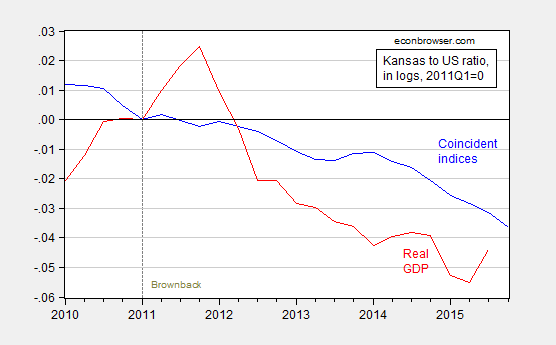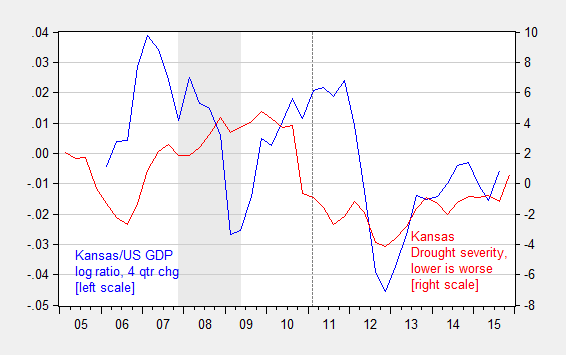Ironman of Political Calculations asserts that my use of Philadelphia Fed coincident indices is misleading, particularly in reference to Kansas’s performance is my attempt to overstate the poor performance of that state’s economy. He argues that one should use a comprehensive measure, like gross domestic product — so without further ado, let’s compare Kansas relative performance using both measures.
Figure 1 depicts the Kansas/US ratios, where an increase denotes an improvement in Kansas’s performance relative to the US.
Figure 1: Log coincident index for Kansas divided by US (blue), and log GDP for Kansas divided by US (red), both normalized to 2011Q1. Dashed line at 2011Q1, accession of Governor Brownback. Source: BEA, author’s calculations.
Note that performance measured using Ironman’s preferred measure, state GDP, is 1.3% percentage points worse (in log terms) than using coincident indices, as of 2015Q3 (latest available data).
Ironman has also criticized me for attributing to Governor Brownback’s policies effects on Kansas economic activity that should properly be attributed to the drought. Figure 2 depicts Kansas relative performance (4 quarter change in log ratio Kansas to US GDP), and the Palmer Drought Severity Index (PDSI), where lower values denote worse drought. A priori, one expects a positive correlation.
Figure 2: Four quarter difference in log ratio of Kansas GDP to US GDP (blue, left scale), and Palmer Drough Severity Index, quarterly average of monthly data (PDSI) (red, right scale). Source: BEA, NOAA, NBER, and author’s calculations.
The astute observer will note that there is a pretty poor correlation between relative growth of Kansas and the drought index. More formally, run a regression over the 2005Q3-2015Q3 period:
ΔyKSt = -0.001 + 0.106 ΔyKSt-1 + 1.300ΔyUSt + 0.0006PDSIt + ut
Adj-R2 = 0.45, NObs = 41, SER = 0.009, DW=1.65. bold denotes significance at the 10% msl, using HAC robust standard errors.
Note that the drought index coefficient is not statistically significant. I’m sure with enough work, I could get it to be statistically signficant in some specification. In any case, it doesn’t pop out easily.
Actually, this is the second time that Ironman has raised the drought excuse. I responded in an addendum to this post. In that case, Kansas was underperforming, even after taking into account the drought. Ironman never responded to that result.
This is not a defense of using the Philadelphia Fed coincident indices in all cases; this 2013 FRB Philadelphia document details the fact that the indices do not track certain states’ GDPs (particularly commodity dependent ones). Kansas actually has a fairly high correlation, at 0.55-0.70.
So much for today’s specious statistical critique debunking. See also this post for a previous installment.


Kansas has long wanted a vacation. A very long one.
According to an article in Economic Review, although a drought reduces crop production, the drought can raise farm incomes and land prices, because farmers sell their grain stocks at higher prices and the higher prices attract land purchases. Also, low grain stocks can keep prices high in the future, even with more production. Moreover, exports can remain strong at higher prices with a weaker dollar. So, over time, the net effect of a drought can be positive, negative or have little effect on an economy.
That’s why I stopped following Political Calculations. Too much of that over there.
There’s a lot of data baking in climate change. Some studies show the Medieval Warm Period, before the Little Ice Age, in 950 to 1250 was warmer than today and other studies show it was colder than today. Some studies show warming is overwhelmingly caused by natural forces, e.g. solar radiation, volcanoes, ocean currents, etc., while other studies show it’s primarily caused by humans. However, a Stanford University study shows that historically in warm periods, there was greater prosperity than in cold periods. What to believe? One thing is certain, there is a strong bias on the theory humans primarily cause climate change.
The variable volcano means more volcanic activity has a cooling effect.
“Some”. Yes, that is correct. However, in one case some means 95%.
Do we know how much of global warming is caused by human activity? If 95% of global warming is caused by human activity and 5% caused by all non-human factors, then, perhaps, we should make the world’s population trillions of dollars poorer.
what makes you think we need to make the world poorer? why do you think controlling man made warming makes the world poorer?
peak, the evidence is rather convincing that humans are a major contributor to global climate change in the current era. that should be irrelevant as to whether you believe warmer or colder periods are helpful or detrimental to prosperity.
There were big changes in global climate before human activity. There is no “convincing” evidence humans have been a “major contributor” to “global climate change.” However, there are a lot of biased studies, along with data baking. To ignore that is dishonest.
And, we’re fortunate we’ve been in a warming cycle, since the Little Ice Age ended in 1850.
peak
“There were big changes in global climate before human activity.”
this is in no way inconsistent with the case that there are changes, today, caused by human activity. and the evidence today, suggests to a high probability, that the change has been brought about by human activity. to ignore this is dishonest. to knowingly ignore this is a hack.
we faced a similar ideology in the 1970′ and 1980’s, when a bunch of hacks denied regional pollutants could disrupt entire ecosystems. until acid rain destroyed those ecosystems. similar denial and intentionally misleading arguments were proposed back then as well
http://www.sourcewatch.org/index.php/Citizens_for_the_Environment
interestingly, the koch brothers were wrong on acid rain. they have a similar agenda with global warming. in light of their behavior with acid rain, what makes you think their positions on global warming are better?
in fact, policy related to acid rain was argued to be ineffective, too costly, and growth inhibiting. opponents were wrong on all counts. same arguments are being made against global warming measures today. why do you think your arguments are correct today, in light of past failures?
So, because humans have caused pollution, they’re causing global warming. Talk about being “dishonest” and a “hack.”
And, how do you propose to reduce global warming cheaply and how much will the global temperature fall?
“So, because humans have caused pollution, they’re causing global warming.”
if you want to categorize greenhouse gases as pollution, then yes. the evidence suggests humans are an important cause of current global warming. only a hack and the uneducated disagree.
“how do you propose to reduce global warming cheaply ”
if you break it, you buy it. there is an aging cohort who have polluted the world, and now want to push their irresponsibility off to the next generation. and with every cost, there is an opportunity. the cost is not as dire as you would lead some to believe. the acid rain example illustrated very clearly the dire cost of cleaner air was not as “dire” as opponents suggested. but pushing the cost onto future generations, through denial and avoidance, is irresponsible.
Your premise is global warming is undesirable.
However, global warming, since 1850, has raised living standards and extended life spans substantially.
peak, you are conflating two independent issues.
first, human action is influencing global climate change. the evidence strongly suggests this is the case. and if we are a contributor, we have some control over how much we influence global climate change. we have an obligation take responsibility for the changes we create.
second, and independant, is the consequences of a warmer or colder climate on human kind. it is not simply warmer or colder, but how much warmer or colder. there is an upper bound beyond which the consequences could be rather significant. just because we have survived during the recent temperature increase does not mean we will continue to thrive under continued temperature increases. only a hack would imply that is the case.
“However, global warming, since 1850, has raised living standards and extended life spans substantially.”
Correlation does not imply causation.
Ironman might want to spend more time in Kansas. His story doesn’t hold up.
http://www.nass.usda.gov/Statistics_by_State/Kansas/Publications/Crops/whthist.pdf
slugbaits: I think Ironman is in his own world, regardless of where he is physically located. For sure, confronting him with data doesn’t seem to induce him to revise his conclusions. (Nonetheless, he can do deflation of nominal to real GDP series in his head!!!)